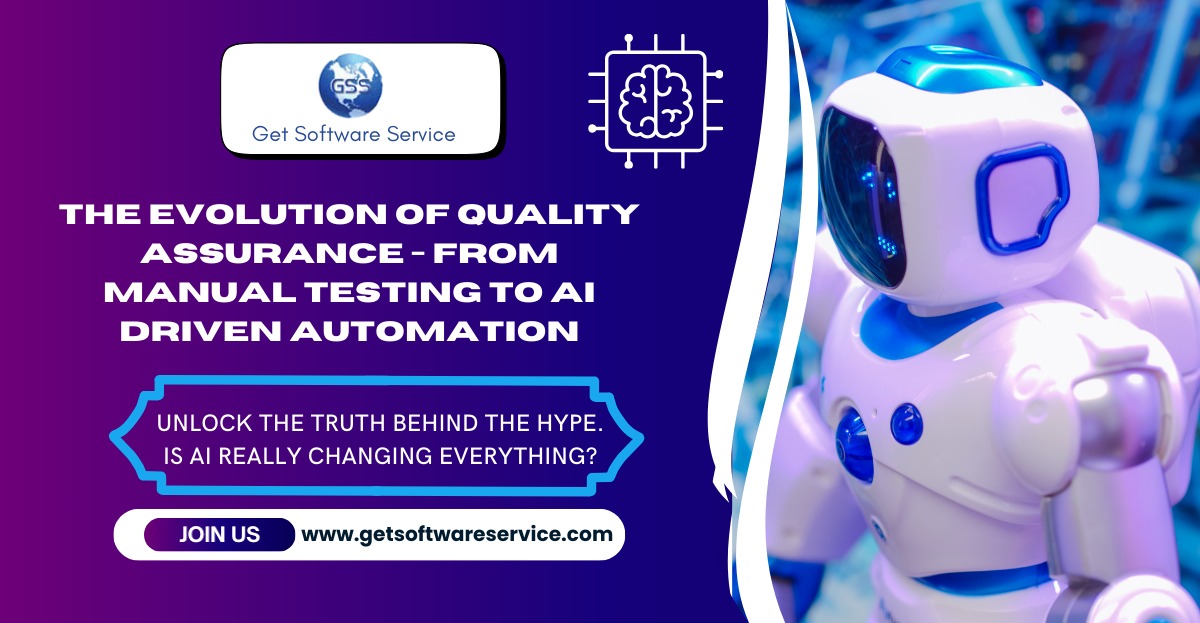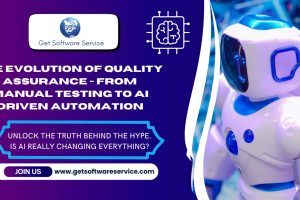
The Evolution of Quality Assurance – From Manual Testing to AI-Driven Automation
In today’s rapidly evolving digital landscape, Quality Assurance (QA) has transitioned from labor-intensive manual testing to cutting-edge AI-driven automation. As a result, software products now meet higher standards of quality, security, and user satisfaction. With businesses increasingly adopting Agile, DevOps, and CI/CD (Continuous Integration/Continuous Deployment) methodologies, traditional QA practices have gradually given way to intelligent automation. Consequently, this shift optimizes testing cycles and minimizes human error, ensuring faster and more accurate testing processes.
Moreover, Gartner predicts that by 2025, 70% of organizations will have implemented some form of hyper-automation. This means that businesses will leverage AI, machine learning (ML), and robotic process automation (RPA) to streamline operations. As a result, QA professionals must adapt by embracing AI-powered tools to maintain relevance and enhance testing efficiency. Otherwise, they risk falling behind in an industry that is rapidly evolving.
At Get Software Services (GSS), we are at the forefront of this transformation. We offer Online QA Training in the USA, including specialized programs in Virginia, California, and all other states, preparing professionals to adapt to the evolving QA landscape. This article explores the journey of QA services, from its humble beginnings in manual testing to the rise of AI-driven automation that is shaping the future of quality assurance.
The Early Days of Quality Assurance: Manual Testing
The origins of QA can be traced back to manual testing, where human testers played the role of end-users to identify bugs, validate functionality, and ensure software quality. Manual testing, although effective in identifying intricate issues, was:
Time-Consuming and resource-intensive.
Prone to human error, leading to inconsistencies.
Difficult to scale across large, complex applications.
Despite these challenges, manual testing provided valuable insights that were critical for identifying user-centric issues. Testers would meticulously execute test cases, ensuring that applications performed as intended across multiple environments. However, as software development cycles became shorter and more frequent, manual testing alone could no longer meet the demands of modern applications.
The Shift to Automated Testing: Accelerating QA Processes
With the advent of automated testing tools like Selenium, QTP (QuickTest Professional), and Appium, QA teams began transitioning from manual testing to automation to enhance efficiency and scalability. Automated testing brought:
Faster execution of repetitive test cases.
Increased accuracy and consistency in test results.
Enhanced coverage across multiple devices, platforms, and browsers.
Continuous Integration/Continuous Deployment (CI/CD) frameworks further revolutionized the QA landscape by enabling developers to integrate and test code continuously, catching bugs earlier in the development lifecycle. Automated regression tests could now be run seamlessly with every code change, ensuring rapid releases without compromising quality.
The Rise of AI-Driven QA: Transforming the Landscape
As AI and machine learning advanced, they began to transform QA services by introducing AI-driven automation that enhanced efficiency, accuracy, and predictive capabilities. AI-driven QA leverages intelligent algorithms to:
Predict Defects: Analyze historical data to identify high-risk modules, preventing defects before they occur.
Self-Healing Scripts: Automatically adjust test scripts in response to application changes, reducing maintenance efforts.
Enhanced Test Case Optimization: Dynamically prioritize test cases based on risk factors and application changes.
How AI-Driven QA Transforms Software Testing
AI-driven QA processes have not only reduced testing time but also enhanced the overall quality of software products by offering:
- Self-Healing Test Automation
AI-powered tools automatically detect changes in an application’s UI and update test scripts accordingly. For example, an AI-driven automation framework can adapt to changes in an e-commerce website’s checkout process, ensuring that tests remain valid without manual intervention. - Predictive Defect Analysis
AI models analyze historical defect patterns to predict which modules of an application are most likely to fail. For instance, a financial app with frequent updates can use AI to predict high-risk areas and focus testing efforts on those modules. - AI-Enhanced User Experience Testing
AI algorithms analyze real-world user behavior to simulate realistic usage patterns, ensuring that the software performs optimally under varying conditions. - Continuous Compliance Monitoring
In industries with stringent compliance requirements (e.g., healthcare and finance), AI-driven QA ensures real-time validation of regulatory standards, minimizing the risk of non-compliance.
Advantages of AI-Driven QA in Modern Software Development
The integration of AI in QA services offers numerous benefits, including:
Increased Accuracy: AI minimizes human error, enhancing test precision and consistency.
Faster Time-to-Market: AI accelerates testing processes, enabling faster releases.
Cost Efficiency: Automated processes reduce the need for manual intervention, lowering operational costs.
Scalability: AI can manage complex testing scenarios across diverse environments.
Why AI-Driven QA is Essential for Modern Enterprises
As enterprises increasingly adopt Agile, DevOps, and cloud-based technologies, the need for faster, more reliable QA processes is paramount. AI-driven QA ensures that businesses can:
Deliver high-quality applications faster.
Identify and resolve defects before they impact users.
Maintain compliance with industry regulations effortlessly.
With AI at the helm, QA teams can transition from reactive testing to predictive quality management, ensuring superior software quality and seamless user experiences.
Challenges in Adopting AI-Driven QA Practices
Despite its advantages, adopting AI-driven QA practices comes with its own set of challenges:
High Initial Investment: Implementing AI-powered QA frameworks requires a significant initial investment.
Skill Gap: QA teams must acquire expertise in AI technologies to leverage them effectively.
Human Oversight Required: While AI automates many tasks, human intuition and critical thinking remain essential for complex testing scenarios.
To overcome these challenges, organizations should invest in comprehensive Online QA Training programs that equip QA professionals with the skills needed to navigate AI-driven testing environments.
Future of QA: Blending AI with Human Expertise
The future of QA lies in a hybrid approach where AI-driven automation complements human expertise to deliver superior software quality. Key trends shaping the future include:
Shift-Left Testing: Integrating testing earlier in the development lifecycle to catch defects sooner.
AI-Powered Predictive Analytics: Leveraging AI to forecast potential defects and optimize test coverage.
Testing for Emerging Technologies: As IoT, AR, and VR gain traction, QA teams must adapt their testing strategies to ensure seamless user experiences across diverse ecosystems.
Online QA Training with Get Software Services (GSS)
At Get Software Services (GSS), we provide Online QA Training in the USA to equip QA professionals with the skills required to excel in AI-driven QA environments. Our comprehensive training programs cover:
Online QA Training in Virginia – Master automation frameworks like Selenium, Appium, and more.
QA Training in California – Learn AI-powered testing techniques and predictive defect analysis.
Online QA Training Across All States in the USA – Gain hands-on experience with self-healing test scripts and continuous compliance monitoring.
Whether you’re an aspiring QA professional or a seasoned tester looking to upgrade your skillset, our courses are designed to help you stay ahead in this rapidly evolving field.
Conclusion: Embrace the Future of QA with AI-Driven Automation
The evolution of QA from manual testing to AI-driven automation has redefined how software quality is maintained in modern enterprises. By leveraging AI, ML, and hyper-automation, QA teams can deliver higher-quality software at a faster pace, ensuring seamless user experiences and compliance with industry standards.
As the digital landscape continues to evolve, staying ahead requires a deep understanding of AI-powered QA techniques. Get Software Services empowers QA professionals with the knowledge and skills needed to thrive in this AI-driven era. Join our Online QA Training programs today and become a part of the future of QA!
👉 Enroll Now to Future-Proof Your QA Career!



